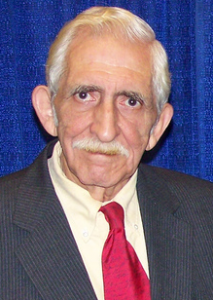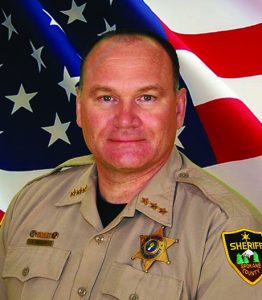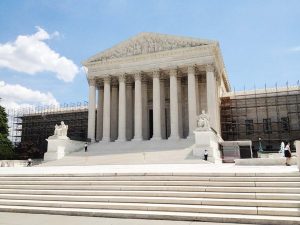By Dave Workman | Senior Editor
It was the year Democrats pushed impeachment of President Donald Trump, low voter turnout allowed anti-gun Democrats to take power in Virginia and the final print edition of TheGunMag.com rolled off the presses and into history.

Joseph P. Tartaro, Editor Emeritus
As TGM went all digital, veteran executive editor Joe Tartaro hung up his spurs, bringing an end to a career spanning decades with Gun Week and then TGM, a presence that will be sorely missed by all who worked with him over the years. Tartaro continues to write occasionally for the online publication.
With Democrats controlling the U.S. House, their focus through the entire year was getting Trump. Appearing incapable of moving past the 2016 presidential election they expected to win handily, Capitol Hill Democrats played sore losers all year long, with their efforts culminating in House impeachment hearings that were likened to “kangaroo courts.” Two articles of impeachment that had nothing to do with the original allegations against the president were finally passed by the House Judiciary Committee under anti-gun Chairman Jerry Nadler.
The year opened with former Arizona Congresswoman-turned-gun-control-advocate Gabrielle “Gabby” Giffords travelling to Capitol Hill to help introduce H.R. 8, a measure that, if passed, will require federal background checks for virtually all firearms transactions, including private sales.
It contrasted with a bombshell draft report from the Florida panel reviewing the Feb. 14, 2018 mass shooting at Marjory Stoneman Douglas High School in Parkland that included a recommendation to allow armed teachers in schools. Florida educators opposed the idea while the Second Amendment community supported it.
According to USA Today, “Former New York City Police Commissioner Bill Bratton called arming teachers ‘the height of lunacy,’ while Richard Myers, executive director of the Major Cities Chiefs Association, said few police chiefs back such proposals.”
However, the lawmen who served on the commission obviously have a different opinion. They include Commission Chair Sheriff Bob Gualtieri of Pinellas County, Miami Shores Police Chief Kevin Lystad, who served as vice chair; Okaloosa County Sheriff Larry Ashley and Polk County Sheriff Grady Judd.
TGM also reported it when the Wall Street Journal revealed that Europeans have been increasingly buying firearms in some countries, “in part by insecurity arising from terrorist attacks,” got attention from Second Amendment activists in the United States because of the irony.
U.S. gun prohibitionists have long touted the kinds of gun control laws in Europe as an example to be followed in this country, except that the Second Amendment and state constitutional right-to-bear-arms provisions stand in the way.
According to the story, in 2017, “Europe’s unregistered weapons outnumbered legal ones…44.5 million to 34.2 million, according to the Small Arms Survey.” It is not entirely clear how the Survey came up with that estimate, but the story quoted Nils Duquet of the Flemish Peace Institute in Belgium, who said the unregistered guns are used “mostly by criminals.”
That was actually a stunning revelation because it only confirms what rights activists in this country have been contending for decades: criminals and terrorists do not obey gun laws. Instead, they ignore the existence of increasingly restrictive gun laws that only seem to hamper the rights of honest citizens.
And the story said something else that might further erode the anti-gun lobby’s advocacy of European-type gun laws for the U.S.
Lawmen Take Stand

Spokane County, WA, Sheriff Ozie Knezovich
As the full facts emerged about gun control Initiative 1639, passed by Washington state voters in November 2018, a majority of that state’s county sheriffs lined up to declare they would not enforce the measure.
At least 20 county sheriffs in the Evergreen State, which constitutes more than half of the top cops, were “publicly refusing to police new gun laws,” one newspaper lamented.
During the campaign, The Citizens Committee for the Right to Keep and Bear Arms, National Rifle Association, Washington Arms Collectors and other Second Amendment groups opposed the initiative.
I-1639, passed by just under 60 percent of voters, also mandates so-called “enhanced background checks,” a 10-day waiting period for delivery of a “semiautomatic assault rifle,” so-called “secure storage” without defining what that is or how it will be enforced, proof of gun safety training within the past five years, and registration. Anti-gun Gov. Jay Inslee and Attorney General Bob Ferguson warned sheriffs they needed to enforce the law or face consequences.

Former New York City Mayor Michael Bloomberg
The same tactic came in Virginia as the year wound down, with scores of counties refusing to enforce any new gun control laws that anti-gun Democrats pass in 2020 after winning control of the General Assembly with the help of a $2.5 million expenditure by anti-gun billionaire Michael Bloomberg.
Sheriffs in New Mexico and other states also lined up to refuse enforcement of gun control laws in their jurisdictions.
Two states went for “Constitutional carry” early in the year. Fulfilling a campaign pledge, newly-minted South Dakota Gov. Kristi Noem signed legislation making it possible for residents of the state to carry concealed sidearms without a permit. The new statute took effect July 1.
Then-Kentucky Gov. Matt Bevin signed legislation to allow his citizens over the age of 21 in the Commonwealth to carry a concealed firearm without a permit, bringing the number of states with so-called “Constitutional Carry” to 16. That law also took effect in July. Bevin lost his re-election bid in November.
In Illinois, anti-gun Democrat State Reps. Daniel Didech and Jonathan Carroll introduced legislation that would require gun buyers or current gun owners to “reveal their public social media accounts to Illinois police before they’re approved for a firearm license.” The legislation, according to the Herald & Review in Decatur, would also allow revocation of the Firearm Owners Identification (FOID) card for posting “disagreeable content,” without defining what that might be.
Dick’s Dumps Guns
Embattled Dick’s Sporting Goods, which changed its policy on firearms sales following the 2018 Florida high school shooting and was subsequently boycotted by gun owners, decided it would “strip firearms and other hunting products from 125 of its stores.” Reports suggested the move cost Dick’s a bundle of money.
Guns were very much on everyone’s minds worldwide when a madman launched attacks on two mosques in Christchurch, New Zealand. Afterwards, Prime Minister Jacinda Ardern went on a gun control tear.
Fifty people were killed in the double-attack and dozens more were wounded. The suspect, Brenton Tarrant, had assembled a lengthy “manifesto” in which he admitted that one of his reasons for the mayhem was the desire that a conflict over the Second Amendment would erupt in the United States.
While that fact seemed to get lost by the establishment media, it was not lost on Second Amendment activists in the U.S. And, with the decision by the Kiwi government to ban a whole class of firearms, the suspect is possibly getting exactly what he wanted.
In that document, the suspected killer apparently wrote his purpose was, “to create conflict between the two ideologies within the United States on the ownership of firearms in order to further the social, cultural, political and racial divide within the United states (sic). This conflict over the 2nd amendment and the attempted removal of firearms rights will ultimately result in a civil war that will eventually balkanize the US along political, cultural and, most importantly, racial lines. This balkanization of the US will not only result in the racial separation of the people within the United States ensuring the future of the White race on the North American continent, but also ensuring the death of the ‘melting pot’ pipe dream.”
Subsequently, Ardern told CNN that she does not understand why the United States can’t change its gun laws like her country and nearby Australia did.
Back here in the U.S. Pittsburgh residents with support from the National Rifle Association promptly filed a lawsuit against the city after liberal Mayor Bill Peduto signed a package of ordinances that critics claim violated state preemption. A court ultimately agreed.
The gun control measures were adopted in response to the October 2018 attack on the Tree of Life Synagogue that left 11 people dead and another seven wounded.
In the Courts
A federal judge’s ruling that the California ban on “large capacity magazines” is unconstitutional prompted state Attorney General Xavier Becerra, the defendant in the case, to quickly file for a stay of the judge’s ruling while an appeal to the Ninth Circuit Court in San Francisco proceeds.

U.S. Supreme Court
U.S. District Judge Roger Benitez handed down an 86-page ruling that many say is a devastating review of the failure of California gun control, with repeated reminders that rights secured under the Second Amendment are not subject to public whim or popular votes. The case is known as Duncan v. Becerra.
The case could have ramifications across the entire Ninth Circuit, which covers many of the western states, including Hawaii and Alaska, and perhaps nationally. If Judge Benitez is upheld, it could signal the beginning of possible challenges to similar restrictions in other states.
A federal lawsuit challenging Washington State’s gun control Initiative 1639 advanced one more step when a federal judge in Tacoma denied a motion to dismiss the action, saying that law-abiding gun owners and firearms retailers do not have to violate the law and risk punishment in order to challenge infringements of the Second Amendment.
U.S. District Court Judge Ronald B. Leighton handed down the 13-page decision.
The lawsuit was filed by the Second Amendment Foundation and National Rifle Association. Joining them are two firearms retailers at opposite ends of the state, and four young adults whose rights are directly affected by provisions of the initiative. I-1639 was passed in November 2018 by just under 60 percent of the vote, and was immediately challenged by SAF and NRA.
Also in Washington State, SAF and NRA are pursuing a legal challenge to a City of Edmonds “safe storage” requirement that violates the state preemption law. A Snohomish County Superior Court judge ruled that a 2018-passed ordinance in the City of Edmonds requiring so-called “safe storage” of firearms “impermissibly regulates firearms in violation” of Washington’s 36-year-old preemption law, possibly setting the stage for a state Supreme Court showdown. In a separate case, filed by SAF and NRA against the City of Seattle in neighboring King County, a different judge ruled the opposite. That case is now before the State Court of Appeals.
There was “cautious optimism” after the U.S. Supreme Court heard arguments in a case challenging a now-defunct New York City handgun law that prohibited traveling outside the city with a legally-licensed handgun. City officials were so worried about the court setting a gun rights precedent, they hastily changed the law earlier in the year, but apparently to no avail.
In the West
There has been a lot of gun control v. gun rights activity in the West this year. In Oregon, Republican state senators playing hardball used a parliamentary maneuver to compel majority Democrats to discard a major piece of gun control legislation in exchange for returning to the Senate chambers, where a subsequent party-line vote allowed Democrats to adopt a major tax package for education.
In Oregon, there must be at least 20 senators in the chamber to take a vote on anything. The Republican walkout left Democrats with only 18 occupied seats so they could not pass any legislation. Once Republicans returned, following a four-day walkout, the majority took their vote, split along party lines. The multi-billion-dollar education package passed while Senate Bill 978, which spanned 26 pages and added all sorts of new gun control, died.
In Colorado, the anti-gun Brady Campaign apologized for attempting to exploit a somber vigil for the victims of a high school shooting.
One day after the shooting at STEM School Highlands Ranch left one student dead and several others injured, a Brady Campaign youth group called Team Enough organized the vigil, attended by a large crowd of students and parents. It was supposed to have been a forum to allow the audience to share their feelings, but it turned into what some critics described as a campaign event and gun control rally when politicians took to the podium.
Students and parents walked out, condemning the pols for trying to hijack the event. The audience, which had gathered to honor the heroism of Kendrick Castillo, the 18-year-old STEM student who sacrificed his life by charging at one of the armed suspects and being fatally wounded. Castillo was scheduled to have graduated only three days later.
“We are deeply sorry any part of this vigil did not provide the support, caring and sense of community we sought to foster and facilitate and which we know is so crucial to communities who suffer the trauma of gun violence,” the Brady Campaign said in part.
NRA Turmoil
The story that kept tongues wagging for most of the year was about turmoil within the NRA. The organization found itself in a tempest, with lawsuits and counter-suits filed by NRA against its longtime public relations firm Ackerman McQueen, and by Ack-Mac versus NRA.
 At the Indianapolis convention, then NRA President Ollie North abruptly stepped down in what has been variously portrayed as an attempted coup to unseat longtime Executive Vice President Wayne LaPierre, or an effort by North to right a ship that was listing seriously due to questionable financial troubles and a frontal legal and political assault by New York officials, where NRA is incorporated.
At the Indianapolis convention, then NRA President Ollie North abruptly stepped down in what has been variously portrayed as an attempted coup to unseat longtime Executive Vice President Wayne LaPierre, or an effort by North to right a ship that was listing seriously due to questionable financial troubles and a frontal legal and political assault by New York officials, where NRA is incorporated.
NRA’s longtime chief lobbyist Chris Cox was suspended and subsequently resigned amid allegations, which he rigorously denied, that he had been part of the “attempted coup.”
LaPierre was re-elected as EVP two days after a stormy members meeting at which dissidents raised questions and sought answers about alleged money mismanagement. Both President Trump and Vice President Mike Pence appeared at the convention, prior to the eruption of fireworks.
The controversy swirls around NRA finances and its lawsuit against Ackerman-McQueen. That group has reportedly been paid tens of millions of dollars by NRA for public relations work over the years, including television and advertising campaigns.
New York Attorney General Letitia James—no friend of the organization—announced she was launching an investigation of NRA and issuing subpoenas. James has called the NRA a “terrorist organization,” as noted by the Huffington Post and others.
Just a few days ago, the New York Times did an update on the NRA controversy with an interview with LaPierre that seemed more of a rambling history lesson than an update on the current situation.
There is no small degree of urgency about the NRA problems, as 2020 is a presidential and congressional election year, and the nation’s gun owners need a strong, unified organization to lead the fight to protect the White House and U.S. Senate.
Stunner at Gun Rally
No year is without its surprises, but quite possibly the stunner that at least briefly overshadowed the NRA story was the appearance of former Brady Campaign President Dan Gross at a Gun Rights Rally in Washington, D.C.
There, the former gun control front man told thousands of gun owners, “law-abiding gun owners have been unfairly demonized” by the gun control crowd. In an exclusive interview with TGM and Liberty Park Press, Gross acknowledged that some people in the gun control movement have “an ideological hatred of guns and people who own them.”

Dan Gross
Not surprisingly, the national press ignored Gross’ revealing remarks.
The former gun control lobbyist told TGM that he had encountered several people who weren’t interested in saving lives so much as they wanted to ban gun ownership.
“I can’t tell you,” Gross said, “how often people would come up to me with a smile thinking they were getting on my good side by saying, ‘I think we should get rid of all the guns.’”
“There is nothing that pisses me off more than people who pretend they care about saving lives, but really have other agendas,” Gross added.
One of his chief criticisms about gun control proponents is that many would say they were “looking for common ground, but then project an ideological hatred of guns. It made my job impossible.”
Gross at the time was preparing to launch a project with veteran firearms trainer and Second Amendment activist Rob Pincus that could be a turning point in the gun rights versus gun control debate.
Pincus confirmed the two have been working together for almost a year on creating the Center for Gun Rights and Responsibilities (CGRR). They will announce a modest project “before the end of the year,” Pincus revealed.
At the rally, he told the crowd, “The reality is, when it comes to guns, in many ways I believe I have much more in common with all of you, a crowd of proud, law-abiding and responsible gun owners than I do with a crowd of people who just want to ban guns.”
Bad business decision?
Emerging from the ground-shaking news that SportCo Holdings, which owns Ellett Brothers and United Sporting Company (USC), had filed for Chapter 11 bankruptcy was the stunning acknowledgement that management had “banked on Hillary Clinton winning the election” in 2016, causing them to up their inventory of firearms and ammunition that “no one wanted.”
That’s how it was portrayed in The Outdoor Wire, while Reuters reported that Donald Trump’s surprise victory in 2016 brought a slowdown in gun and ammunition sales. With Trump in the White House, fears about gun control have waned, despite calls for more gun regulation following mass shootings in Florida and Virginia Beach.
But the gun rights battle heated back up again as Democrats east and west made gains in elected offices. Big talk of gun control efforts in Virginia late in the year ignited a rebellion of local governments. A majority of Virginia counties declared themselves Second Amendment Sanctuaries, joining an expanding number of counties across the country that are saying no more to gun control. Those counties have a friend in the White House, as Trump has made 187 appointments to the federal bench, and if he is re-elected in 2020, that scorecard will climb even farther. These are conservative judges, bringing balance to the liberal courts.
That rebellion stretched to Colorado, where dozens of Colorado sheriffs are ready to defy” a new state gun control law when it takes effect in 2020.
The law, according to CBS, is modeled on language authored in part by Josh Horwitz, head of the anti-gun Coalition to Stop Gun Violence. He described it as “a temporary civil restraining order that allows family members or law enforcement to go to a court… before a tragedy occurs.”
Trump’s public signing of withdrawal from a global arms treaty immediately infuriated the Left, while an audience of about 15,000 National Rifle Association members broke out in cheers at the annual NRA Leadership Forum immediately after he inked the document.
American gun owners have been opposed to the treaty, which has never been ratified by the United States, despite support by the Obama administration. But it has gathered dust in the Republican Senate, and Trump told the roaring crowd so long as he remains in office, their gun rights are secure.
Seattle Tax Failed…again!
Three years after Seattle’s controversial “gun violence tax” on the sale of firearms and ammunition in the city, revenue from the tax has declined even further and the number of homicides reported in the city has steadily climbed.
That prompted the Second Amendment Foundation, which unsuccessfully sued the city along with the National Rifle Association and National Shooting Sports Foundation to stop the tax, to declare that the scheme was a “dismal failure.”
 In 2015, when the tax was championed by then-Seattle Councilman Tim Burgess, he predicted it could bring in between $300,000 and $500,000 annually. The revenue would have been used for “gun violence research” and other projects aimed at reducing or preventing crime, under the Burgess plan, which was also championed by then-Mayor Ed Murray.
In 2015, when the tax was championed by then-Seattle Councilman Tim Burgess, he predicted it could bring in between $300,000 and $500,000 annually. The revenue would have been used for “gun violence research” and other projects aimed at reducing or preventing crime, under the Burgess plan, which was also championed by then-Mayor Ed Murray.
However, it was far too rosy a forecast, as things turned out. Last year the tax, which levies a $25 fee on the sale of every firearm and a 5-cent tax on each round of centerfire ammunition, brought in a comparatively paltry $77,518. That was down more than $15,700 from the 2017 revenue of $93,220.74, which was more than $10,000 below the $103,766.22 collected in 2016, the first year of the tax.
The embarrassing shortfall was not released voluntarily. TGM had to file a Public Records Act lawsuit, supported by SAF, to compel the city to report the revenue data. Initially, the city tried to satisfy the PRA request by reporting that the 2016 revenue was “less than $200,000,” but TGM remained firm, citing the public’s right to know and other First Amendment concerns. When the first year’s revenue figure was released after a King County Superior Court judge ruled against the city, other news agencies also reported the shortfall.
Making matters worse, the number of murders in Seattle has steadily climbed since the tax was imposed.
On the flip side, New Hampshire Gov. Chris Sununu vetoed three gun control bills, declaring “These three bills would not solve our national issues nor would they prevent evil individuals from doing harm, but they would further restrict the constitutional rights of law abiding New Hampshire citizens.”
It was a stunning move in the wake of a vigorous effort by gun prohibitionists to move their anti-rights agenda along in the wake of mass shootings in California, Ohio and Texas.
FBI Crime Report
In late September, the FBI Uniform Crime Report for 2018 said violent crime declined overall 3.3 percent from 2017, and the number of reported homicides involving firearms also dropped, leading the Citizens Committee for the Right to Keep and Bear Arms to ask Democrats and the gun prohibition lobby: “What ‘gun violence’ epidemic are you talking about?”
CCRKBA Chairman Alan Gottlieb was alluding to a stream of allegations by leading anti-gunners that the country is in the grip of a “gun violence epidemic.” The numbers said otherwise.
“So, the number of murders has gone down,” Gottlieb observed at the time. “Yet, in order to create the impression that this country is awash in violent crime, gun grabbers routinely combine the number of homicides and suicides, plus accidental deaths and call them all acts of so-called ‘gun violence.’ It is deliberately misleading and downright dishonest. Why are Democrats and the gun prohibition lobby lying about this?”
About the same time, the Crime Prevention Research Center updated its report on concealed carry, estimating now there are more than 18.6 million active concealed carry licenses and permits in circulation.
It represents a 304 percent increase in legally-armed private citizens with carry permits or licenses since 2007.
The new estimate also translates to 7.3 percent of all adults in the United States, and approximately 8 percent growth over the number of active licenses and permits since 2018. More than 2.1 million additional carry licenses/permits have been issued since Donald Trump became president, said Dr. John Lott, founder and president of the Center. The researcher and author added that this may not represent all the people legally carrying because 16 states have adopted “constitutional carry,” allowing open or concealed carry without a license or permit.
In reaction, gun prohibitionists in Seattle announced their 2020 agenda, and it was watched by gun owners across the nation because Washington is now a test tube state for gun control schemes. On the agenda are background checks on ammunition purchases, “restricting access to high-capacity magazines,” and “protecting our children from gun violence.”
The local Moms Demand Action group also wants mandatory training for concealed pistol licenses.
Washington residents launched a recall effort against Washington Attorney General Bob Ferguson, and hundreds of volunteers launched a campaign to repeal anti-gun-rights Initiative 1639.
The Road Ahead
There appears no doubt that 2020 will be a rocky year for gun owners, despite the strong support for “Second Amendment Sanctuary” efforts. The push will come to shove during legislative sessions and again late in the summer as the national election cycle ramps up.
Gun control versus gun rights will remain in the spotlight, and activists are telling their more lethargic shooting and hunting buddies that this is no time to sit out an election. Voter registration will be important for gun owners, as will making sure they vote.
Perhaps gun owners will push out anti-gun-rights Democrats in Oregon, Washington, Virginia and elsewhere, and maybe elect conservative pro-rights governors and congressional representatives.
TGM will cover it all.



